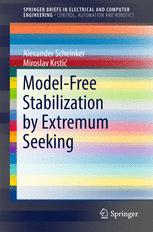

Most ebook files are in PDF format, so you can easily read them using various software such as Foxit Reader or directly on the Google Chrome browser.
Some ebook files are released by publishers in other formats such as .awz, .mobi, .epub, .fb2, etc. You may need to install specific software to read these formats on mobile/PC, such as Calibre.
Please read the tutorial at this link: https://ebookbell.com/faq
We offer FREE conversion to the popular formats you request; however, this may take some time. Therefore, right after payment, please email us, and we will try to provide the service as quickly as possible.
For some exceptional file formats or broken links (if any), please refrain from opening any disputes. Instead, email us first, and we will try to assist within a maximum of 6 hours.
EbookBell Team

5.0
38 reviewsWith this brief, the authors present algorithms for model-free stabilization of unstable dynamic systems. An extremum-seeking algorithm assigns the role of a cost function to the dynamic system’s control Lyapunov function (clf) aiming at its minimization. The minimization of the clf drives the clf to zero and achieves asymptotic stabilization. This approach does not rely on, or require knowledge of, the system model. Instead, it employs periodic perturbation signals, along with the clf. The same effect is achieved as by using clf-based feedback laws that profit from modeling knowledge, but in a time-average sense. Rather than use integrals of the systems vector field, we employ Lie-bracket-based (i.e., derivative-based) averaging.
The brief contains numerous examples and applications, including examples with unknown control directions and experiments with charged particle accelerators. It is intended for theoretical control engineers and mathematicians, and practitioners working in various industrial areas and in robotics.